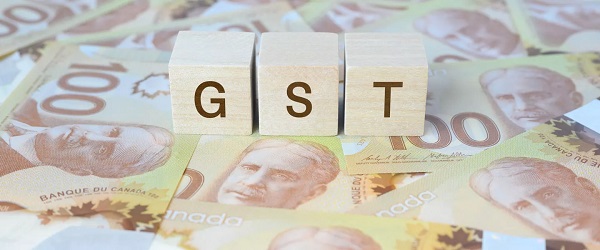Business
Ottawa’s GST break and rebate cheques amount to bad policy

From the Fraser Institute
By Jake Fuss and Grady Munro
On Thursday, the House of Commons passed legislation (tabled by the Trudeau government) that would temporarily suspend the federal Goods and Services Tax (GST) on select items from December 14 to February 15 at an estimated cost of $1.6 billion, as part of the government’s “more money in your pocket” plan. The legislation now goes to the Senate for approval.
The government has delayed a separate proposal—to give Canadians $250 rebate cheques—in light of NDP demands to expand eligibility to include seniors. The original proposal would have sent cheques to an estimated 18.7 million Canadians (who worked in 2023 and earned $150,000 or less) at a cost of $4.7 billion. While aimed at all Canadians, this proposal is eerily similar to the recent move by Ontario’s Ford government, which plans to send $200 cheques to Ontarians. And again, it’s just bad policy.
Why?
Consider this. During the recent discussion about increasing Old Age Security payments by 10 per cent for seniors aged 65 to 74, former Bank of Canada governor David Dodge said, “The last thing that we need to be spending money on at this point in time is boosting consumption for relatively well-off people.” This critique also applies to the Trudeau government’s $250 rebate cheques, which would go to many well-off Canadians. Indeed, based on the government’s original proposal, a couple earning a combined household income of up to $300,000 could receive these cheques.
Moreover, because onetime payouts and temporary tax breaks don’t incentivize people to work and invest, they don’t help raise living standards. But permanent tax cuts, such as reducing personal income tax rates or lowering capital gains taxes, would provide a stronger incentive for Canadians to work more and make investments because they get to keep more of the money they earn. That would help drive economic growth, create jobs and provide more economic opportunities for workers across the income spectrum.
In fact, the Trudeau government’s plan may actually hurt economic growth in the long run. The government is expected to run budget deficits for the foreseeable future, and will likely borrow the billions needed to pay for the GST break and $250 cheques. In other words, this “relief” package will likely increase the federal deficit in 2024 and potentially 2025. By borrowing more money, the government will increase the tax burden on future generations of Canadians who ultimately must pay off today’s debt. And just as lower taxes improve economic incentives, this higher future tax burden will worsen incentives and likely stifle economic growth and reduce living standards.
Don’t be deceived. While it’s nice to get a cheque in the mail and have a couple months free of the GST for some items, the Trudeau government’s “more money in your pocket” plan is bad policy.
Business
Carney and other world leaders should recognize world’s dependence on fossil fuels

From the Fraser Institute
By Julio Mejía and Elmira Aliakbari
Simply put, despite trillions invested in the energy transition, the world is more dependent on fossil fuels today than when the United Nations launched its first COP. No wonder that ahead of COP30, leading voices of the net-zero-by-2050 agenda, including Bill Gates, are acknowledging both the vital role of fossil fuels on the planet and the failure of efforts to cut them.
On the heels of his first federal budget, which promises more spending to promote a “green economy,” Prime Minister Carney will soon fly to Brazil for COP30, the 30th United Nations climate summit. Like the former Trudeau government, the Carney government has pledged to achieve “net-zero” emissions in Canada—and compel other countries to pursue net-zero—by 2050. To achieve a net-zero world, it’s necessary to phase out fossil fuels—oil, natural gas, coal—or offset their CO2 emissions with technologies such as “carbon capture” or large-scale tree planting.
But after trillions of dollars spent in pursuit of that goal, it appears more unrealistic than ever. It’s time for world leaders, including Canada’s policymakers, to face reality and be honest about the costly commitments they make on behalf of their citizens.
For starters, carbon capture—the process of trapping and storing carbon dioxide so it’s unable to affect the atmosphere—is a developing technology not yet capable of large-scale deployment. And planting enough trees to offset global emissions would require vast amounts of land, take decades to absorb significant CO2 and risk unpredictable losses from wildfires and drought. Due to these constraints, in their net-zero quest governments and private investors have poured significant resources into “clean energy” such as wind and solar to replace fossil fuels.
According to the International Energy Agency (IEA), from 2015 to 2024, the world’s public and private investment in clean energy totalled and estimated US$14.6 trillion (inflation-adjusted). Yet from 1995 (the first COP year) to 2024, global fossil fuel consumption increased by more than 64 per cent. Specifically, oil consumption grew by 39 per cent, natural gas by 96 per cent and coal by 76 per cent. As of 2024, fossil fuels accounted for 80.6 per cent of global energy consumption, slightly lower than the 85.6 per cent in 1995.
The Canadian case shows an even greater mismatch between Ottawa’s COP commitments and its actual results. Despite billions spent by the federal government on the low-carbon economy (electric vehicle subsidies, tax credits to corporations, etc.), fossil fuel consumption in our country has increased by 23 per cent between 1995 and 2024. Over the same period, the share of fossil fuels in Canada’s total energy consumption climbed from 62.0 to 66.3 per cent.
Simply put, despite trillions invested in the energy transition, the world is more dependent on fossil fuels today than when the United Nations launched its first COP. No wonder that ahead of COP30, leading voices of the net-zero-by-2050 agenda, including Bill Gates, are acknowledging both the vital role of fossil fuels on the planet and the failure of efforts to cut them.
Why has this massive effort, which includes many countries and trillions of dollars, failed to transition humanity away from fossil fuels?
As renowned scholar Vaclav Smil explains, it can take centuries—not decades—for an energy source to become globally predominant. For thousands of years, humanity relied on wood, charcoal, dried dung and other traditional biomass fuels for heating and cooking, with coal only becoming a major energy source around 1900. It took oil 150 years after its introduction into energy markets to account for one-quarter of global fossil fuel consumption, a milestone reached only in the 1950s. And for natural gas, it took about 130 years after its commercial development to reach 25 per cent of global fossil fuel consumption at the end of the 20th century.
Yet, coal, oil and natural gas didn’t completely replace traditional biomass to meet the surging energy demand as the modern world developed. As of 2020, nearly three billion people in developing countries still relied on charcoal, straw and dried dung to supply their basic energy needs. In light of these facts, the most vocal proponents of the global energy transition seem, at the very least, out of touch.
The world’s continued reliance on fossil fuels should prompt world leaders at COP30 to exercise caution before pushing the same unrealistic commitments of the past. And Prime Minister Carney, in particular, should be careful not to keep leading Canadians into costly ventures that lead nowhere near their intended results.
Business
Liberals refuse to disclose the amount of taxpayer dollars headed to LGBT projects in foreign countries

From LifeSiteNews
The Liberal government of Prime Minister Mark Carney will not openly disclose how much money from its foreign-aid budget is going toward overseas “gender identity” and “decolonization” projects.
According to the government, there are “concerns” that disclosing the amount of funds could endanger certain LGBT organizations that get money from it.
On November 3, Global Affairs Canada, in response to a question on the order paper from a Conservative MP, said that the funding amounts could not be made public due to claimed “security concerns” and “confidentiality requirements.”
“These are the most common reasons projects are considered sensitive: the organization or individuals might be in danger if it becomes known that they are receiving funds from a foreign government; (or) implementing a project related to sensitive topics such as two-spirit, lesbian, gay, bisexual, transgender, queer, intersex and additional sexually and gender-diverse people rights, human trafficking, early/forced marriage, (and) human rights defenders,” Global Affairs noted.
Continuing, Global Affairs said that there is a possible “danger” to partner organizations that could be “forced to close” or even “arrested” due to “harassment from the local population or government.”
As reported by LifeSiteNews, Carney’s budget will include millions in taxpayer money for “SLGBTQI+ communities,” gender equality, and “pride” safety.
Canada’s 2025 federal budget is allotting some $54.6 million to LGBT groups in a move criticized by Campaign Life Coalition as prioritizing activist agendas over struggling families’ basic needs.
Canadian taxpayers are already dealing with high inflation and high taxes due in part to the Liberal government overspending and excessive money printing, and even admitting that giving money to Ukraine comes at the “taxpayers’” expense.
As recently reported by LifeSiteNews, Bank of Canada Governor Tiff Macklem gave a grim assessment of the state of the economy, essentially telling Canadians that they should accept a “lower” standard of living.
-

 Agriculture2 days ago
Agriculture2 days agoBovaer Backlash Update: Danish Farmers Get Green Light to Opt Out as UK Arla Trial Abruptly Ends!
-

 Business2 days ago
Business2 days agoCarney’s Floor-Crossing Campaign. A Media-Staged Bid for Majority Rule That Erodes Democracy While Beijing Hovers
-

 espionage19 hours ago
espionage19 hours agoChinese-Owned Trailer Park Beside U.S. Stealth Bomber Base Linked to Alleged Vancouver Repression Case
-

 Alberta1 day ago
Alberta1 day agoSchool defunding petition in Alberta is a warning to parents
-

 Business1 day ago
Business1 day agoLiberals refuse to disclose the amount of taxpayer dollars headed to LGBT projects in foreign countries
-

 Daily Caller18 hours ago
Daily Caller18 hours agoLaura Ingraham Presses Trump On Allowing Flood Of Chinese Students Into US
-

 armed forces2 days ago
armed forces2 days agoIt’s time for Canada to remember, the heroes of Kapyong
-

 Digital ID1 day ago
Digital ID1 day agoCanada moves forward with digital identification for federal benefits seekers






